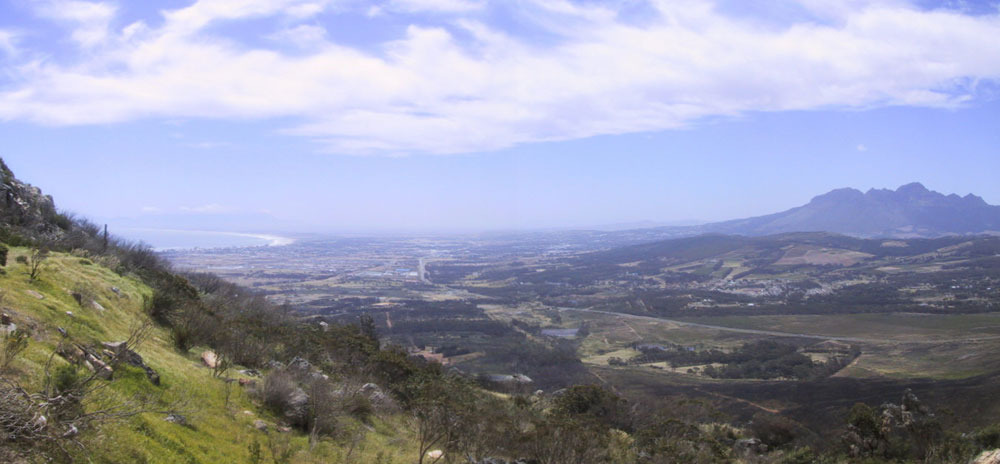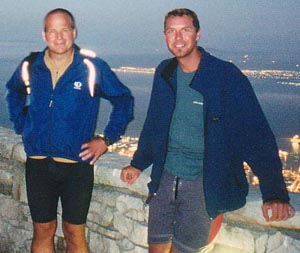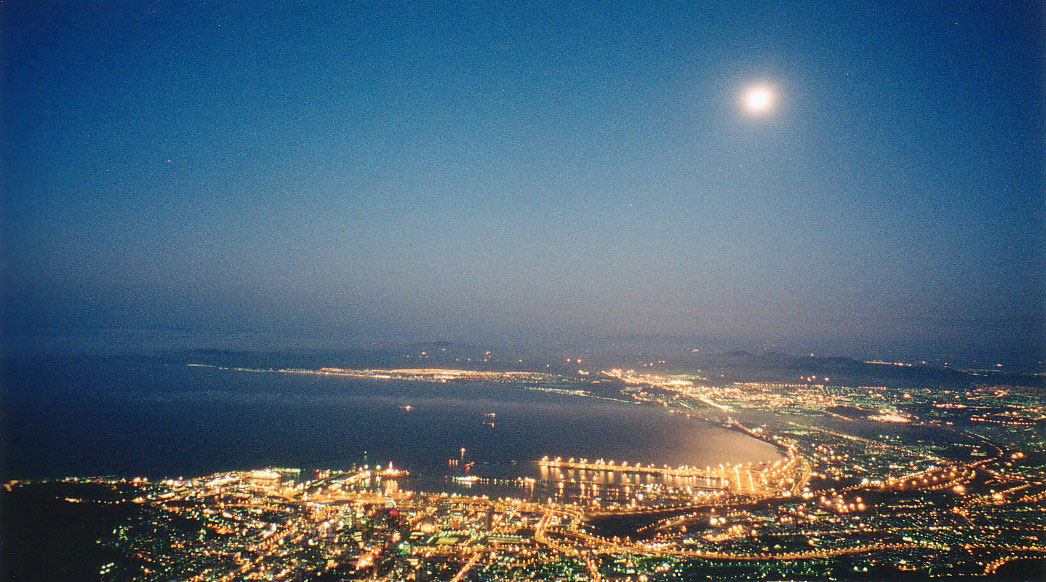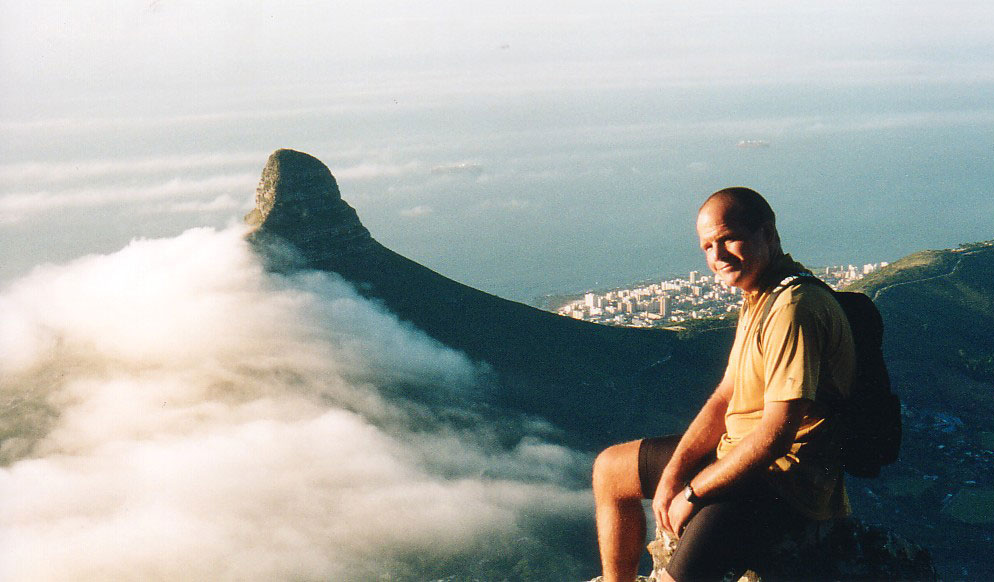
|
I rolled into Cape Town on 24 December, exactly one year from the day I left California on my six month journey. By now, it was becoming obvious that the plan had changed. The day before Cape Town I climbed the last serious hill that I would climb for a while. I didn't know it at the time, but it would be nearly nine months before I climbed a mountain fit to climb again. The really funny part about this hill was the downhill side though. I ground my way up the hill over the course of a couple of hours, and then when I got to the top I got seriously hammered by very strong and gusty winds. The winds were so bad that I could be riding along the road and all of a sudden I would be 1 meter over to the left. Since another meter to the left was a precipitous drop, this made me a bit nervous. In the end, I wound up going down the hill at less than my normal flat ground speed because the wind just made me too nervous to bonzai down at high speed. It didn't take as long to go down the hill as it took to go up it, but it sure seemed like it. This is the view from the top of the hill.

What you're seeing here isn't actually Cape Town, but the first of a series of suburbs along the Cape Peninsula. The peninsula is a little thumb of land that sticks out at the southwestern corner of South Africa. The peninsula is at the place where the Indian and Atlantic oceans mix, which is what can give it such violent storms in the winter. The Atlantic has a flow of cold water from the Antarctic going north, and the Indian has a flow of warm water circling around from the eastern parts of Africa. The Atlantic side is noticeably cold, even in summer, while the Indian side is pretty warm even in winter. When Vasco de Gama first "discovered" the cape, he named it the Cape of Storms, but his king was a bit more up to speed on PR and renamed it the Cape of Good Hope. It did in fact signal good hope for Portugal. De Gama actually found what he was looking for, a sea route to India and China on the next trip. This bypassed the land route that went through the mighty Islamic empire that covered the Middle East and Northern Africa, and allowed Europe to gradually cut the Muslims out of the world economy. The Muslim empire had complete control of the extremely profitable trades in spices and silk, because all land routes from "the Orient" went through Muslim territory. They never bothered to develop sea travel though, and also never really took any interest in anywhere outside of the Muslim empires. Once a land route was found, their trade started declining quickly and it was only a matter of time until Western Europe became dominant.
What you're seeing here is the Indian Ocean side. I went down the road, but when it started getting too busy with Cape Town traffic, I took my usual detour. I went south to a small resort community, and took a dip in the Indian Ocean. I would later take more than a few on the Atlantic side, and can quite readily attest to the idea that it's a bit chilly. It's roughly the same temperature in my experience as northern California, say around San Francisco. People go to the beach, and it's nice to go in the water for a dip but nobody stays in for extended periods without a wetsuit unless they're substantially tougher than I am.
Cape Town instantly appealed to me, and immediately had a different appearance from every other city I saw in SA. All the guidebooks rave on about the place and list it as a must-see. I'll have to agree with them. When I rode in, I got an overwhelming feeling nearly instantly. My first impression was "Wow, this is just like a regular city". By that, I mean that every other city I went through in SA reminded me of an armed camp. Cape Town on the other hand looked pretty normal. Sure, it has grates that pull down over storefronts and the other security devices I've seen in nearly every city of any size anywhere in the world, but it didn't have the dangerous aspect that I'd become used to. The fences weren't as intimidating looking, the razor wire was mostly missing, the armed response signs were less prominent and it generally had a safer feeling.
It turns out that Cape Town does in fact have a pretty high crime rate, but it's not as high as some other places such as Johannesburg. After getting used to the place, I got so I walked where I wanted and when I wanted without any real fear. People still get their houses and businesses broken into a bit more than they would in most American cities, but it's not quite as far out as the rest of SA seemed.

Photo Courtesy Jonathan |
About a week before I got to Cape Town, happenstance intervened on my behalf once more, as it usually does. I ran into Jonathan at a guest house about a week before Cape Town. We started talking about my journey and found out that we had a lot in common. We're both on a track for making fairly substantial changes in our lives, both of us think we're partway through the journey, we both expect to have the changes fully dialed in after another 50 years or so, and we both have had eye-opening experiences. John is another computer geek, but he's an expert on networking and internetworking. A few years ago he was working away in a job, and after one fairly unpleasant 16 hour day he got to thinking on the way home "This just isn't right". He went in the next morning and gave his notice, despite not really having any idea where he was going. It all worked out in the end as he set up an independent ISP (Internet Service Provider) company and he's now got a successful business that's relatively stress free, and providing for his needs just fine. Update: A year later, Jon is now off on a long-term trip a lot like mine that will last six months or so.
John and I hit it off quite well immediately, and he even came up with the title I would use for any book I might write about this experience (don't hold your breath though). I would call the book "Stepping Out Of The Machine". The Machine is a metaphor for a type of life that's dominated by work, expectations, societal pressures, internal pressures, consumerism and the like. I spent a good part of my life at least partly within what was an obvious machine, and I feel like this trip has allowed me to step outside of it and look back inside. I'll write some of my observations about the machine later in one of these web pages, but for the moment I'll continue.
John's flat mate was out of town in Paris for a couple of months, so he invited me to take the extra room until she came back. I got a nice place to stay, and she got her rent paid for a month so it all worked out pretty well in the end. I got to try the almost forgotten experience of cooking food in an actual kitchen... well, reheating food anyway. He had a DVD and all the goodies one could hope for. I even got a lesson in the basics of Cricket. A friend defined Cricket as "like baseball, but not as boring". My completely uninformed opinion is that it does seem to be a bit better of a spectator sport, but I never really got the Cricket bug.
During the trip in SA, I had been studying a bit about meditation and trying practicing it a bit. John had been doing meditation for some time, and had a great "spiritual library" full of books that he was happy to lend me and discuss. I found several of the books to be quite good. My favorites were The Four Agreements and The Alchemist: A Fable About Following Your Dream. Both get extremely mixed reviews from other people I've recommended them to. Everyone seems to either love them or hate them. John and I got along quite well, and I count him as a good friend I've made along this mad journey. In the end, I think we both learned something from each other and we both got a lot out of the time together. As I sit here writing this page nearly a year later I have let the meditation completely slide, and have learned a few more things through the subsequent year. In the end, I found it an enlightening experience for both of us.
Cape Town is geographically one of the best situated places I've ever seen. Unfortunately, I was very lazy about getting photos of it, so you'll just have to either take my word for it or go there. The city center is quite small for a town of it's size (2 million), because it's squeezed between a table mountain that rings one side, and the sea on the other side. There are only about 2 km of space between them, so the building starts at the shore and works its way up the mountain.
There are a whole bunch of mountain climbs readily accessible from the city. I made a few of them fairly regularly that were within easy walking distance of where I was staying. Lion's Head is the first, and it's a nice hour walk for someone just on an easy hike. During the first couple of months there I kept somewhat in shape by running up it once or twice a week. I'd walk for a half-hour to get to the base of the mountain, then run up it, and walk back. I started out matching John's best time of 35 minutes, but got it down to 24 before I was done.
Table Mountain is the other good climb. You can climb it in about an hour, and then walk back or take a cable car down the other side. You can also do bungee jumping from the cable car in the mornings. I always planned to do that, but never actually pulled it off. Jon took this moonlight photo one night when we climbed it.

Here you can see Lion's Head in the background in another photo Jon shot that I quite like.

Photos Courtesy Jonathan
By the time I got to Cape Town, I was getting pretty far behind on work. I still have a job and that means I still need to produce results. I'd worked a few months during the previous year and pretty much earned my keep, but it was time to put my nose to the grindstone and get something out the door. I'd also gotten some emails commenting that my Mid-Life Crisis had apparently turned into a Mid-Lifestyle Change. This seemed pretty true, as by this time I still hadn't quite figured out what I wanted to do with my time for the foreseeable future, but I was certain I didn't want to go back to Silicon Valley and climb back into the machine. I talked with my boss back at work, and formally gave up the office that they had been very nicely holding for me upon my return. I also made arrangements to make the working situation semi-permanent, and set up a reasonable expectation of time to be worked and results to be produced. This all meant that I needed to work around 5 months or so per year, because with anything less than that I wouldn't really be able to be very productive and I'd run out of money pretty soon anyway.
I sat down to work in Cape Town, and did a somewhat reasonable job of getting my nose to the grindstone. I found it pretty difficult to get back into a regular work schedule after all this time, but it is possible and I set out to finish the project I had worked on for a month way back in Petrozovodsk (Russia). It had been on the shelf for 3 months by then, and someone back at work was waiting for the results.
After leaving Jon's when his flat mate returned, I settled into the work thing in Cape Town, and gradually got back quite a few of my bad habits. I have to fess up that I did lots and lots of things that as a manager I'd yell at people for because they reduce your effectiveness. I worked long hours, lots of days in a row and the whole bit. Contrary to popular belief, working long workweeks actually reduces the total work output for anyone in a thinking profession. Aside from the fact that it's a stupid way to burn up the time you have on earth, it reduces the total output of work because effectiveness gradually slides to the point where you get less done in 60 hours than you could in 40 hours. Unfortunately, the habit of working long hours is a hard one to get rid of, and it comes back pretty easily if I let it.
After a few months in Cape Town, I almost quit thinking of it as part of the trip at all, since I was doing the same thing I would have been doing back in Silicon Valley. All is not lost though. One thing I wanted to experience on this trip was the sense of living and working in another place. Cape Town was a good place to do that. I established a regular routine, and except for the fact that I was living in a tiny little hotel room, it was just about like living back in California. I made a small social circle of friends that I hung out with, and I got to be something close to a native. I also managed to get caught up on my cinema viewing, and got to eat the appropriate number of doughnuts. I found some good restaurants in Cape Town and a fabulous grocery store, and would rate it as a good place to go for food.
I ended up spending five months in Cape Town, and was sad to pull out at the end of it. During the time I was there I hatched a few big schemes for major cycling that turned out to be too ambitious for me. In the end, I decided to keep up something like the schedule I was on for a while, but first I wanted to visit my daughter Noelle in France, so it was off to France for me without a definite plan to follow that visit.
I ended up with 3,500 km (2,170 Miles) in South Africa, bringing my trip total up to 10,500 km (6,510 Miles).
I found South Africa an extremely interesting place to visit, and it met all my expectations. It shows that it is possible to have reasonably non-violent change in this day and age, and I believe the lessons learned there could well be applied to other situations. The last years of Apartheid were certainly far from violence free... in fact they were marked with extreme brutality. However, in the end the old regime was removed without a major war and that just doesn't happen all that often. I can only think of two other examples.
The blatant unfairness of the Colonial System and Apartheid have left a pretty big scar on the country, and it will take some time to heal but I came away feeling that it is in fact healing. In the 80s and 90s it seemed like a hopeless situation, but here just ten years later it seems to be coming together. Sure, there are lots of problems to be ironed out, but since the US has had democracy for 200 years and is still ironing out a lot of problems I think that they're doing pretty good. In the end, they have only had ten years to reverse centuries of colonial domination. You don't fix that overnight, but all the signs I could observe lead me to believe that they are getting there. That's all I could hope for.
SA saw some of the worst of the Colonial excesses during its history. Modern concentration camps were first used on a massive scale here. Ironically, this was on a White vs White war (the Anglo-Boer war) and with the British doing the inventing (specifically Lord Kitchner). The Nazis took this horrible idea to it's final conclusion, and the Spanish originally invented it (in Cuba), but the British made a considerable advancement, killing something like 20,000 non-combatant civilians, mostly women and children. The U.S. supported brutal regimes for decades under the pretext that they were "anti-communist", but ultimately became part of the solution instead of part of the problem, and was a major player in applying the pressure that ended the Apartheid system.
During Apartheid, it would be unfair to tar all whites with the Apartheid brush, and treat them as some kind of demons. Most of the whites I talked to saw the end of Apartheid as a huge weight lifted from their shoulders. My friend Sue spent an hour one night telling me just how great it felt to see it go away on the day the new constitution was voted in. It was like a breath of fresh air. The Whites were born into a system they didn't create and were powerless to change. Many actively worked to change it, and many just tried to live their lives within a framework they inherited.
I would like to point out that there are a fair number of places in the world that could stand to take a look at the example. The most blatant is in Israel/Palestine which is nearly indistinguishable from Apartheid South Africa, but there are a lot more examples out there. Women are treated little better than slaves in much of the Muslim world. Much of the Middle East is dominated by tiny little minority governments that hold power with an iron fist and American weapons. Saddam Hussein was brought into power American help, and kept in power for decades with American help. Lots of other examples are easy to find.
The ruling regime in SA only succumbed to external pressure when that pressure was applied in force by Europe, Australia and America. This only happened when the US began to see the signs of a pending economic collapse in SA, but let's leave the motives aside for the moment. At the bottom line, when the powerful nations of the world applied pressure the pressure was responded to. Up until just a few years before the end of Apartheid, most of the West did business with usual with the Apartheid regime. Once the support of the US and Europe was lost, that was when the changes started taking place. I think that the US and EU could well apply pressure in other places, if their leaders began to either take moral/humanist stands or could see how the current situation is bad for them economically. I can only hope for a leader that can take that step, but if such a leader exists, I haven't seen her yet.